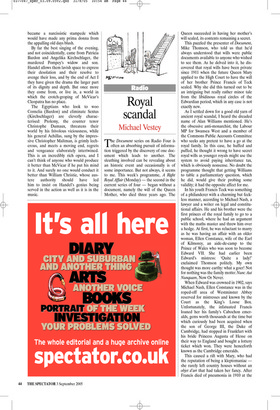Unhappy Handel
Michael Tanner
Glyndebourne’s Giulio Cesare
Proms
The new production of Handel’s Giulio Cesare has been the hit of this year’s season at Glyndebourne, and equally has been one of the year’s biggest Prom successes, evoking raptures at the end which may even have surpassed those induced by Die Walküre. My own feelings about it were so sharply hostile that I thought it worthwhile revisiting it at the Albert Hall, in what I hoped would be a drastically pared-down staging. I was wrong. Besides which the notorious Albert Hall acoustics were in disastrously active form where I was sitting, so that quite often singers were altogether inaudible, though when they moved a couple of steps I could hear them perfectly. I listened to the last act on the recording I made at home, and wondered once more why one makes the effort of going to the Proms when the sound is incomparably superior on the radio. Still, I wanted to see whether the director David McVicar has had any new thoughts about the proper staging of Handel’s masterpiece, and soon discovered that he hasn’t, or if he has he isn’t implementing them this time round.
The production’s sole claim to seriousness is that the invading Romans are presented as British imperialists, though their clothing is as far as the re-interpretation goes. If this is meant as a criticism of colonialism, then there seems to have been very little wrong with it, apart from the discomfort the colonialists must have suffered from not dressing in a way appropriate to the climate. Handel’s opera is intriguing in its mischievous view of human behaviour, the humour on the whole being black; but it is only comic some of the time, and the secret of an adequate production is to make sure that there is no jarring in the transitions from mirth to melancholy. I’d say that the framework of the whole is not comic, but that comic incidents occur within it. McVicar’s view is the opposite of mine, but he isn’t supported by the music, or by most of the action.
The balance which should be struck is very similar to that in Monteverdi’s L’Incoronazione di Poppea, with Cleopatra extraordinarily like Poppea in both loving Caesar and wanting to be his Empress, though there is no question that Monteverdi is the subtler composer, with much more help too from his librettist. Handel’s Cleopatra is one of his more complex characters, and her music shows that her creator recognises that someone who is a vindictive selfish minx can also suffer agonies of bereavement and loneliness and express them in the most poignant tones.
Glyndebourne’s Cleopatra, however, acclaimed as star of the show, the young Australian, American-trained Danielle de Niese, is intent only on turning her whole part into a romp. The serious stretches of her role, which at times approach the tragic, become no more than sulks at the lack of immediate gratification. Wild acclaim has naturally served only to encourage her, so that she can’t take two steps now without doing something delightfully naughty, as though she had never heard of scene stealing. She and Sarah Connolly, the Cesare, make an incongruous pair, for Connolly is if anything a rather earnest performer, and since the vocal evidence suggests that she finds her role rather a strain, the contrast, when they are together, is large enough to generate the feeling that they are in different works. De Niese’s voice doesn’t help: she is one of Nature’s Despinas or Musettas, edgy and with a severely limited range of colour, so she sounds best when she is showing off, and Cleopatra’s final aria ‘Da tempeste’ in which she giddily celebrates her triumph, became a narcissistic stampede which would have made any prima donna from the appalling old days blush.
By far the best singing of the evening, and not coincidentally, came from Patricia Bardon and Angelika Kirchschlager, the murdered Pompey’s widow and son. Handel allows them lavish space to express their desolation and their resolve to avenge their loss, and by the end of Act I they have given the drama the larger part of its dignity and depth. But once more they come from, or live in, a world in which the crotch-groping of McVicar’s Cleopatra has no place.
The Egyptians who look to woo Cornelia (Bardon) and eliminate Sextus (Kirchschlager) are cleverly characterised: Ptolemy, the counter tenor Christophe Dumaux, threatens their world by his frivolous viciousness, while his general Achillas, sung by the impressive Christopher Maltman, is grimly lecherous, and meets a moving end, regrets and vengeance elaborately intertwined. This is an incredibly rich opera, and I can’t think of anyone who would produce it better than McVicar if he put his mind to it. And surely no one would conduct it better than William Christie, whose austere authority should have led him to insist on Handel’s genius being served in the action as well as it is in the music.










































 Previous page
Previous page